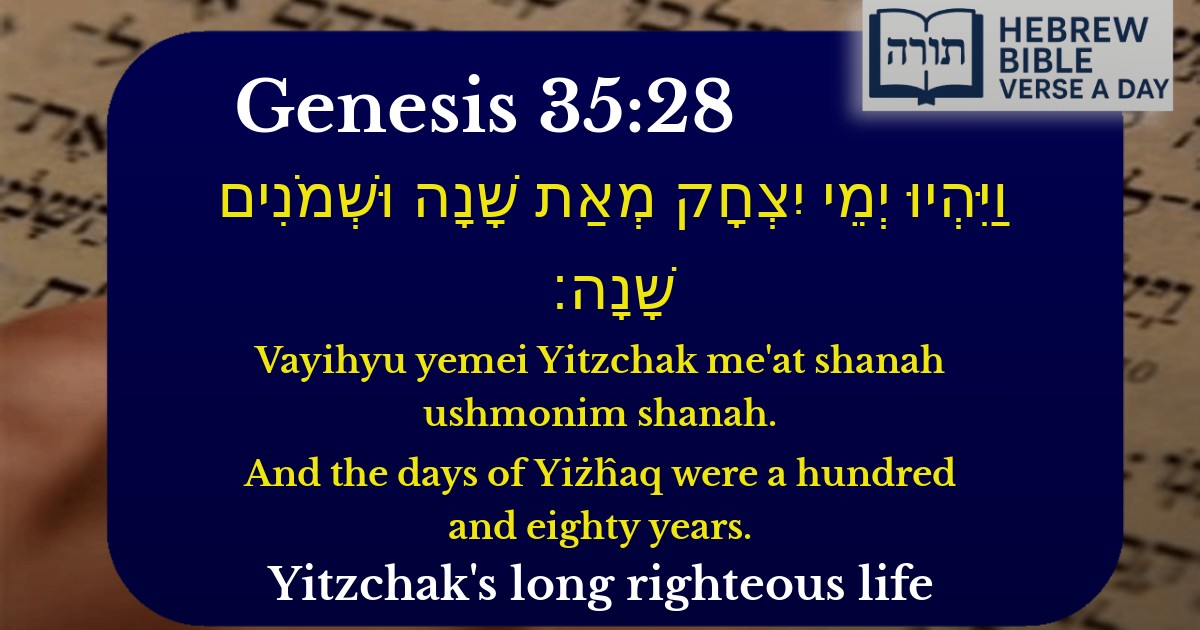Frequently Asked Questions
Q: How long did Yitzchak (Isaac) live according to the Torah?
A: According to Genesis 35:28, Yitzchak lived for 180 years. This is stated clearly in the verse: 'And the days of Yitzchak were a hundred and eighty years.'
Q: Why is Yitzchak's lifespan mentioned in the Torah?
A: The Torah mentions the lifespans of the patriarchs to highlight their righteousness and their role in Jewish history. Yitzchak, as one of the Avot (forefathers), lived a long life as a sign of divine blessing (Rashi on Genesis 35:28).
Q: How does Yitzchak's lifespan compare to Avraham and Yaakov?
A: Yitzchak lived 180 years, which is shorter than Avraham (175 years, Genesis 25:7) but longer than Yaakov (147 years, Genesis 47:28). The Midrash (Bereishit Rabbah) explains that each patriarch's lifespan reflects their unique spiritual role and the era they lived in.
Q: What can we learn from Yitzchak living 180 years?
A: Yitzchak's long life teaches us about the importance of perseverance in serving Hashem. Despite challenges like the Akeidah (Binding of Isaac) and conflicts between his sons, he remained steadfast in his faith (Rambam, Hilchot De'ot).
Q: Was Yitzchak's lifespan considered long for his time?
A: Yes, 180 years was considered a long lifespan even in the era of the patriarchs. While earlier generations (like Noach's descendants) lived much longer, lifespans gradually decreased. The Talmud (Sanhedrin 69b) discusses this decline as part of divine plan for human history.


Lifespan of Yitzchak
The verse states: "And the days of Yitzchak were a hundred and eighty years" (Bereishit 35:28). This lifespan is significant in comparison to his father Avraham (who lived 175 years) and his son Yaakov (who lived 147 years). Rashi comments that Yitzchak's lifespan was shorter than Avraham's because, due to the Akeidah (Binding of Yitzchak), his years were "diminished" by five—Avraham lived 175 years, while Yitzchak lived 180, suggesting that the trauma of the Akeidah had a lasting effect.
Symbolism of 180 Years
The Midrash (Bereishit Rabbah 96:1) notes that Yitzchak's lifespan reflects divine justice. Since he was "offered" on the altar at age 37 (according to one opinion), his life was extended in merit of his willingness to be sacrificed. The number 180 is also numerically significant—the gematria of the Hebrew word "קץ" (ketz), meaning "end," is 180, hinting that Yitzchak's life marked a transition in the patriarchal era.
Comparison to Avraham and Yaakov
Yitzchak's Unique Role
The Ramban explains that Yitzchak's life was characterized by mesirut nefesh (self-sacrifice), both at the Akeidah and later when he allowed himself to be deceived by Yaakov (thinking he was blessing Eisav). His longevity reflects his spiritual resilience. Additionally, the Talmud (Shabbat 89b) teaches that Yitzchak was the only patriarch whose name was never changed, symbolizing his unwavering devotion to Hashem's will.